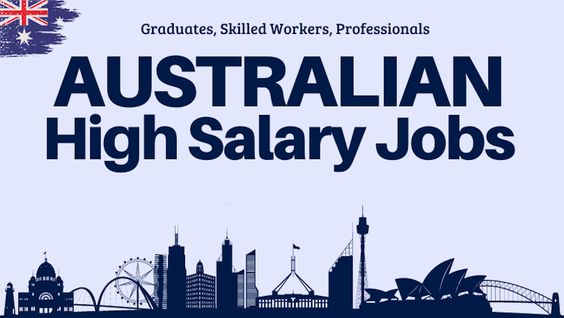Australia Jobs For Immigrants – Work In Australia. Australia offers abundant job opportunities for immigrants aiming to work in a dynamic and diverse setting. With a robust economy, diverse industries, and high living standards, Australia is an appealing destination for those looking to advance their careers internationally. The country’s job market is open to skilled workers from across the globe, allowing immigrants to bring their expertise and talents to sectors such as healthcare, IT, engineering, and education. In this article, we will explore how immigrants can secure jobs in Australia.
Pre-requisites to Work in Australia
Before you can start working in Australia, it’s essential to meet specific pre-requisites to ensure a smooth transition and legal compliance. Here are the key steps to consider:
1. Obtain a Valid Work Visa: The first and foremost requirement is to secure a valid visa that permits you to work in Australia. There are various types of visas available, tailored to different skills, occupations, and durations of stay. Researching and applying for the appropriate visa is the initial step in your employment journey. Common work visas include:
- Temporary Skill Shortage (TSS) Visa (subclass 482): For skilled workers sponsored by an Australian employer.
- Skilled Independent Visa (subclass 189): For skilled workers not sponsored by an employer, state, or family member.
- Skilled Nominated Visa (subclass 190): For skilled workers nominated by an Australian state or territory.
- Employer Nomination Scheme (ENS) Visa (subclass 186): For skilled workers nominated by their employer for permanent residency.
2. Qualifications and Experience Assessment: Your professional qualifications and work experience may need to be assessed by relevant Australian authorities to ensure they meet local standards. This assessment is crucial for validating your skills and making them recognizable to Australian employers. Steps include:
- Skills Assessment: Conducted by designated assessing authorities for specific occupations.
- Recognition of Prior Learning (RPL): If applicable, to assess and recognize your existing skills and experience.
3. Professional Registration or Licensing: For certain professions, you may need to register or obtain a license from a professional body in Australia. This requirement is typical in regulated professions such as healthcare, engineering, and education. Ensure you understand the registration process and requirements for your specific field.
4. English Language Proficiency: Proficiency in English is a critical prerequisite, as English is the primary language of communication in the Australian workplace. Demonstrating a good command of English through standardized tests such as IELTS (International English Language Testing System) or TOEFL (Test of English as a Foreign Language) can significantly enhance your employability and help you integrate more effectively into the work environment. Many visas and employers require proof of English proficiency.
5. Additional Preparations:
- Health Checks: Depending on your visa type, you may need to undergo health examinations to ensure you meet Australia’s health requirements.
- Character Checks: Police clearance certificates from countries you have lived in may be required to prove your good character.
By meeting these pre-requisites, you can ensure a smoother entry into the Australian job market and increase your chances of securing meaningful employment. Preparing thoroughly in these areas will help you transition more easily into your new work environment in Australia.
How to Find Work in Australia
Finding work in Australia requires a proactive approach and a variety of job search strategies. Networking is one of the most effective methods, as many job opportunities are not advertised publicly. Attending industry events, joining professional associations, and connecting with people in your field can open doors to potential job leads.
Online job portals are another valuable resource. Websites like Seek, Indeed, and LinkedIn feature a wide range of job listings across various industries. Tailoring your resume and cover letter to Australian standards and highlighting your skills and experience can increase your chances of securing an interview.
It’s also beneficial to work with recruitment agencies that specialize in your industry. These agencies have extensive knowledge of the job market and can connect you with employers looking for candidates with your skills and experience
Salaries of Australian Jobs For Immigrants
Salaries for jobs in Australia vary significantly based on factors like profession, experience, qualifications, and location. Australia’s diverse economy offers opportunities in sectors ranging from healthcare and education to IT, engineering, and more. The country has a competitive job market for immigrants, especially for those with skills in demand.
Below is a general overview of salary ranges for various professions in Australia, often sought after by immigrants. These figures are meant to provide a broad indication and can fluctuate based on the factors mentioned. It’s important to note that specific visa types might have different salary requirements or conditions attached, influencing these ranges:
| Occupation Category | Salary Range (AUD per year) |
|---|---|
| Healthcare Professionals (Doctors, Nurses) | $70,000 – $250,000 |
| IT Professionals (Software Developer, IT Consultant) | $60,000 – $130,000 |
| Engineers (Civil, Mechanical) | $70,000 – $120,000 |
| Teachers (Primary, Secondary) | $50,000 – $90,000 |
| Accountants and Financial Analysts | $50,000 – $100,000 |
| Skilled Trades (Electrician, Plumber) | $55,000 – $85,000 |
| Hospitality Management | $50,000 – $90,000 |
| Agricultural Workers | $40,000 – $70,000 |
| Construction Workers | $60,000 – $110,000 |
| Scientific Research Professionals | $60,000 – $120,000 |
These salary ranges are indicative and reflect the broad spectrum of potential earnings within these professions. Salaries can be higher for roles in demand, specialized skills, or in regions with a higher cost of living, such as Sydney and Melbourne.
Popular Jobs in Australia
Australia presents a wide array of job opportunities for immigrants, especially in sectors facing skill shortages. Some of the popular jobs for immigrants include:
- Healthcare: There is high demand for doctors, nurses, and allied health professionals.
- Information Technology: Roles such as software developers, cybersecurity experts, and IT project managers are in demand.
- Engineering: Opportunities exist for civil, mechanical, electrical, and mining engineers.
- Education: Teachers and education administrators are sought after, particularly in regional areas.
- Trades: Skilled tradespeople such as electricians, plumbers, and carpenters are needed.
- Hospitality and Tourism: Positions like chefs, hotel managers, and tour guides are available, catering to the vibrant hospitality and tourism industry.
These sectors not only offer employment opportunities but also provide avenues for career growth and development in Australia’s diverse and dynamic work environment. Immigrants with skills and qualifications in these fields can find rewarding careers and contribute to the country’s workforce needs.
Top Jobs in Demand for Immigrants
The current Skills Priority List (SPL) released by Jobs and Skills Australia highlights the top jobs in demand for immigrants across various sectors in Australia. In the healthcare sector, professions like Registered Nurses, Medical Practitioners, and Pharmacists are highly sought after due to the country’s emphasis on providing quality healthcare services. These roles play crucial roles in the healthcare system, offering essential medical care and support to patients.
Registered Nurses, for instance, earn an average salary of over $80,000 per year, making it a popular occupation for skilled migrants. Similarly, the IT sector in Australia is thriving, with opportunities for Software Engineers, Web Developers, and Database Administrators. These professionals are instrumental in designing, developing, and managing software applications, contributing to innovative solutions for businesses and organizations.
In the engineering sector, occupations like Civil Engineering Professionals and Mining Engineers are in high demand, reflecting the need for skilled professionals to drive productivity in Australia’s diverse economy. Civil Engineering Professionals play key roles in infrastructure development, while Mining Engineers contribute to the mining industry’s growth and sustainability.
These roles offer competitive salaries and opportunities for career advancement. Additionally, trades like Motor Mechanics and Metal Fitters and Machinists are essential in various industries, ensuring the smooth operation of machinery and equipment. Skilled migrants in these trades can expect stable employment and attractive salary packages.
Furthermore, the hospitality and tourism sector in Australia presents opportunities for professionals like Chefs, Hotel Managers, and Tourism Operators. Chefs, in particular, have a significant role in the country’s food scene, creating culinary experiences and managing kitchen operations. Hotel Managers oversee the efficient functioning of hospitality establishments, while Tourism Operators organize travel experiences for visitors. These roles offer diverse career paths and the chance to work in dynamic environments.
Challenges and Opportunities
As an immigrant in Australia, you may face challenges such as employment barriers, intense competition for jobs, and issues with recognition of overseas qualifications, as some professions require local accreditation or additional certifications. Cultural differences in the workplace can also impact communication and work dynamics, necessitating adaptation to Australian work culture. Additionally, visa restrictions may limit job opportunities, making it essential to navigate the visa process effectively to secure work authorization in the country.
Overcoming Challenges and Seizing Opportunities
Qualifications and Certifications: Having recognized qualifications or obtaining local certifications can significantly enhance job prospects and credibility with employers. Understanding the requirements for your profession in Australia and taking steps to meet them is crucial.
Work Experience: Both local and international work experience are valuable in demonstrating your skills and expertise to Australian employers. Gaining relevant experience, even through volunteer work or internships, can improve your job prospects.
English Proficiency: English proficiency is essential for effective communication in the workplace and is often a requirement for many roles in Australia. Improving your English skills through courses or practice can be beneficial.
Recruitment Agencies: Leveraging recruitment agencies can help in finding job opportunities by connecting you with potential employers, providing insights into the job market, and offering support throughout the job search process. These agencies can also assist in understanding industry-specific requirements and expectations.
Strategies for Success
Research: Conduct thorough research on the Australian job market, focusing on in-demand professions and understanding industry trends. This will help you target your job search more effectively.
Networking: Building a professional network is crucial. Attend industry events, join professional associations, and connect with other professionals in your field. Networking can lead to job opportunities and provide valuable insights into the job market.
Proactive Job Search: Stay proactive in your job search by regularly applying for positions, following up on applications, and continuously improving your resume and interview skills. Utilize online job portals, company websites, and social media platforms to find job listings.
Adaptability: Be prepared to adapt to the Australian work culture, which may differ from your home country. Understanding workplace norms, communication styles, and cultural expectations will help you integrate more smoothly into your new work environment.
By focusing on enhancing your qualifications, gaining relevant work experience, improving English proficiency, and leveraging the expertise of recruitment agencies, you can navigate challenges and capitalize on opportunities in the Australian job market. This approach will position you for success and help you embark on a rewarding career journey in Australia.
Start a Career in Australia as an Immigrant Today
Immigrant job seekers in Australia can overcome challenges and seize opportunities by emphasizing their qualifications, work experience, English proficiency, and leveraging recruitment agencies. Key steps towards securing rewarding employment include understanding the Australian job market, exploring in-demand professions, and meeting visa requirements. By conducting thorough research, networking effectively, and maintaining a proactive approach in the job search, immigrants can position themselves for success and embark on a fulfilling career journey in Australia.






